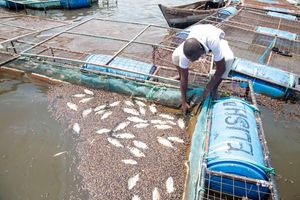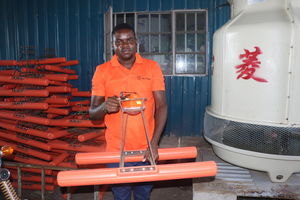How fishermen are contributing to plastic pollution in Lake Victoria

Plastic waste at Koginga Beach in Homa Bay Town on February 18,2025.
What you need to know:
- When humans consume fish that have ingested plastic, there is a potential for these microplastics to enter the human body, causing diseases such as cancer.
Environmentalists have raised concern over increased plastic pollution in Lake Victoria, a vital resource for millions of people. The lake is facing significant pollution challenges, including plastic waste from fishermen and other sources.
Some of the plastics are deposited in the lake by runoff water when it rains and water carries debris downstream.
On the other hand, fishermen discard plastic waste like fishing gear and plastic bags directly into the lake, which then breaks down into microplastics, impacting the ecosystem and the fish populations they rely on for their livelihood.
When fishing, nets need to have floats that keep them on the surface and anchors that hold them down near the lakebed. But in a bid to cut costs, fishermen in Lake Victoria are using improvised and unconventional materials to make floats and anchors.
Materials used to keep nets on the water surface include corks, forms, wood or plastic, while anchors are made of metal. However, the fishermen use plastic water bottles and containers as floats and rocks as anchors.
During a boat ride in the lake, one is more likely to come across water bottles tied together and used to keep fishing nets on the water surface (floats).
Suba South Beach Management Unit Chairperson William Onditi says fishermen prefer using water bottles because they are cheap. “One can easily pick water bottles from a dumpside and use them as floats,” he says.
He notes that floats specifically designed for fishing cost about Sh50,000.
“No fisherman is ready to spend that much if what they get from the lake is just a small fraction of the amount. They therefore go for cheaper options,” he says.
Using water bottles, however, comes with a lot of disadvantages. Often, the bottles are separated from the nets when what is used to tie them together is cut by boat propellers.
Mr Onditi says fishermen try as much as they can to not cut fishing nets using propellers of their boats.
But sometimes accidents happen, and the water bottles are detached from fishing nets, making them float and be carried by waves.
“It is true that the bottles pollute the lake. But there is nothing fishermen can do because of the economic challenges that are facing the sector,” Mr Onditi says.
However, environmentalists are concerned about increased use of plastics in the lake, which they say is likely to have long term side effects on marine and human life.
Mr Willis Omullo, a climate change advocate and the patron at Aluora Makare, an environmental conservation community-based organisation in Homa Bay, says it’s not just floats that pollute the lake, but other fishing gear as well.
He says most materials used to catch fish are made of polyethylene and plastics. Some of them are harmful to the environment when wrongly disposed of.
Mr Omullo says he is concerned about the non-biodegradable nature of plastics, which leads to accumulation in landfills and waterways, where it can entangle and harm marine life, contaminate soil and groundwater and break down into micro-plastics that enter the food chain.
He explains that microscopic plastic particles, often referred to as microplastics, can resemble plankton or other small organisms in size and appearance. This similarity can lead to their ingestion by marine life, including fish.
“When humans consume fish that have ingested plastic, there is a potential for these microplastics to enter the human body, causing diseases such as cancer,” the environmentalist states.
Plastic pollution also poses a significant threat to wildlife. In Lake Victoria, plastic has significant impacts on hippos and aquatic animals.
Mr Omullo warns that if the trend continues, it could lead to the elimination of some animal species.
He notes that there is need for regulations on plastic use, particularly in fishing.
He says the government needs to come up with policies to help minimise the use of plastic in fishing.
“Fishermen should also be educated on the dangers of plastic for them to have behaviour change. A lot of people still don’t know the impact of plastic on the environment and have continuously used them without knowing the harm they are causing,” Mr Omullo says.
But all is not doom and gloom.
A group of students from Tom Mboya University are leading in conserving the lake and keeping it plastic-free by doing regular clean-ups.
The students operating under a group called Save the Earth from A to Z have volunteered to save marine life from plastic pollution.
“'Our plastic zero campaign' focuses on the lake, which is heavily affected by plastic pollution, posing a serious threat to marine life and the ecosystem,” says Basil Amenya, one of the organisers of the clean-up exercises.
Mr Amenya also emphasises the importance of reducing single-use plastics and promoting eco-friendly alternatives to protect water bodies and the environment at large.
He says the group believes that consistent efforts such as regular clean-up exercises will inspire the wider community to adopt responsible waste disposal habits and support environmental conservation initiatives.
Mr Calvins Ogweno, a volunteer, encourages more people to join the movement, saying public participation and awareness is crucial in tackling the growing plastic waste problem.





